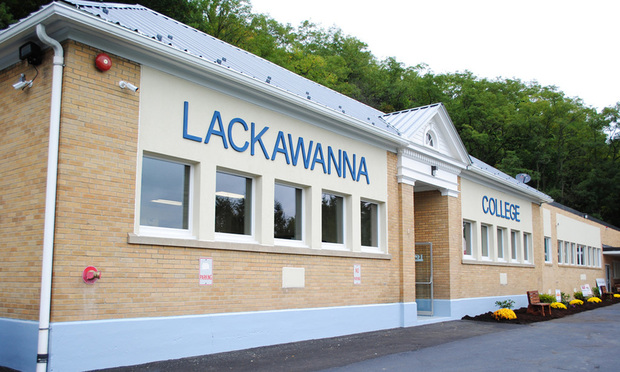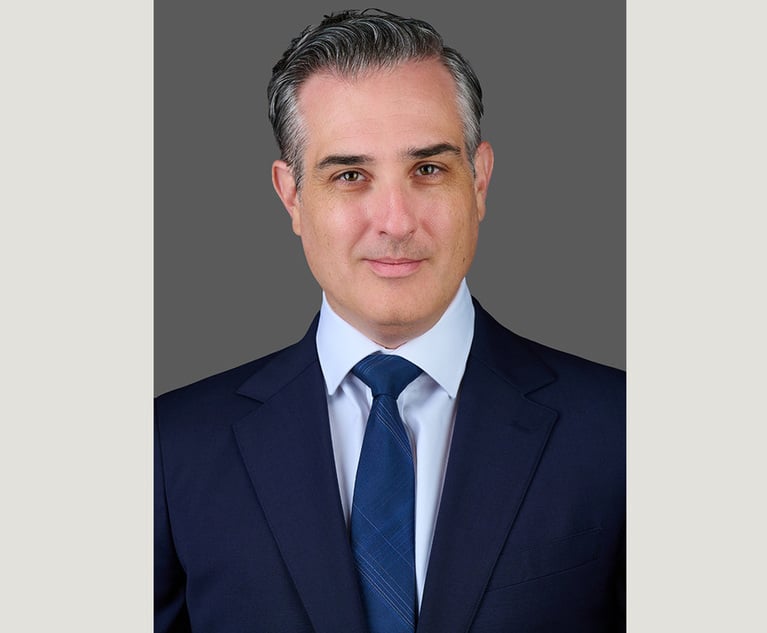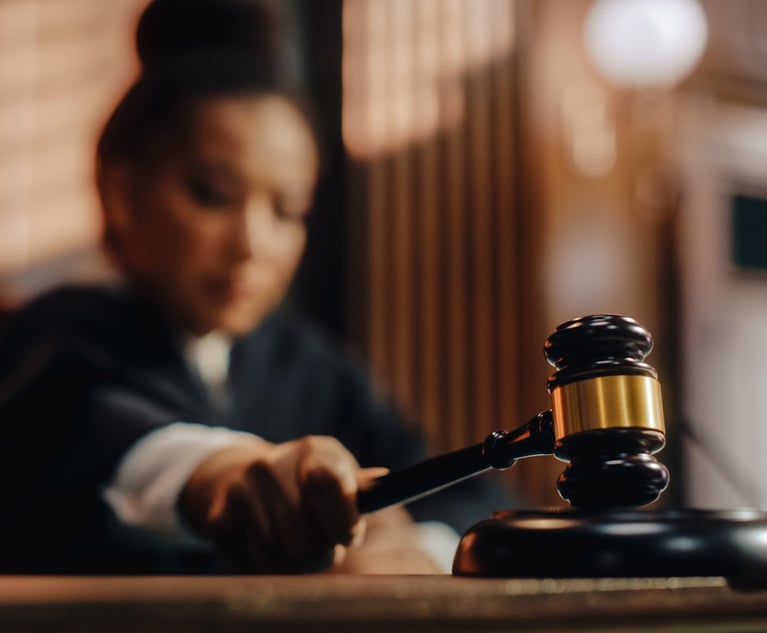Justices Take Up Case on Colleges' Duty of Care to Student-Athletes
The Supreme Court of Pennsylvania is set to deliberate on what standards colleges should adhere to in order to satisfy their duty of care to student-athletes.
December 04, 2017 at 03:29 PM
9 minute read
 Lackawanna College.
Lackawanna College. The Supreme Court of Pennsylvania is set to deliberate on what standards colleges should adhere to in order to satisfy their duty of care to student-athletes.
The justices in a one-page order recently granted allocatur in Feleccia v. Lackawanna College, agreeing to hear argument specifically on whether Pennsylvania colleges are “required to have qualified medical personnel present at intercollegiate athletic events to satisfy a duty of care to the college's student-athletes,” and whether clauses releasing schools from “any and all liability” in connection with intercollegiate football is enforceable when it comes to negligence claims.
The decision to take up the appeal comes about nine months after the Superior Court determined that two football players could proceed with their claims against Lackawanna College over injuries they sustained during practice.
A unanimous two-judge panel held in February that a genuine issue of material fact existed regarding the players' assumption of risk when the college employed unqualified medical personnel and the plaintiffs were injured during a tackle drill rather than during a football game. The decision reversed the trial court's grant of summary judgment to Lackawanna College and remanded the case for trial.
Augustus Feleccia and Justin T. Resch were trying out for Lackawanna College's football team in March 2010 when they were injured performing a variation of the “Oklahoma drill,” which has been criticized in the wake of the National Football League concussion litigation, Judge Jacqueline O. Shogan wrote for the court. Resch suffered a T-7 vertebral fracture when he attempted to make a tackle with his head down. Feleccia endured a “stinger” after his first attempt at a tackle and felt numb in his right shoulder, but was told by defendant Alexis D. Bonisese, a member of the team's medical staff, that he could return to practice, the opinion said. He then suffered a traumatic brachial plexus avulsion.
The athletes sued Bonisese and Kaitlin M. Coyne, whom the college had hired as athletic trainers and retitled as “first responders” upon realizing that they were not certified or licensed to serve as athletic trainers, the opinion said. They were the only training staff working with the team on the day of the injuries. The college, its athletic director and its coaches were also defendants.
The Lackawanna County Court of Common Pleas granted summary judgment based on a waiver the players had signed before the drill and, alternatively, based on the assumption of risk. Feleccia and Resch argued on appeal that the waiver cannot be used as a shield against the claims of gross negligence and recklessness they alleged. The college argued the waiver's clear language demonstrated the students' intent to release the college of all liability.
The waiver is valid, Shogan said, but she disagreed with the trial court's ruling that it is enforceable, finding that the language was insufficiently particular, that the trial court's analysis of the gross negligence and recklessness claims was “incomplete and incorrect,” and that the college's failure to have qualified medical personnel on hand left open an issue of material fact for the jury.
“The college owed [the plaintiffs] a duty of care in their capacity as intercollegiate athletes engaged in a school-sponsored and supervised intercollegiate athletic activity,” Shogan said, adding that the duty of care required the presence of qualified medical personnel and that a jury should determine whether the college breached that duty.
She called the college's arguments that Coyne and Bonisese had statutory immunity as good Samaritans because they were first responders, not athletic trainers, “disingenuous and inapplicable.”
Shogan said that although the plaintiffs were aware of the general risks inherent in playing football, they were unaware of the college's failure to reasonably assure their safety by providing qualified trainers, so a jury should decide whether they assumed the risk of their injuries. Based on testimony from a plaintiffs expert that the drill had little application to the game of football, Shogan also said a jury should resolve whether it is part of the game so that an injury resulting from the drill is an inherent risk of playing.
Shogan also expressed concern about a waiver excusing a college from having qualified medical personnel available for student-athletes. Granting summary judgment to the defense in a situation where medical personnel are called into question, she said, “would jeopardize the health and safety of such student-athletes by removing at least one incentive for colleges 'to adhere to minimal standards of care and safety.'”
Havertown attorney Daniel Siegel, who is representing the plaintiffs, said the Supreme Court's inquiry broadened the issues and that, even though the case does not involve a concussion injury, the case could have an impact on the growing concussion litigations in Pennsylvania.
“They've broadened the inquiry and obviously we will address it,” Siegel said. “We look forward to briefing the case. It's an important issue.”
Eric Schreiner of Kleinbard LLC, who is representing Lackawanna College, did not immediately return a call for comment.
 Lackawanna College.
Lackawanna College. The Supreme Court of Pennsylvania is set to deliberate on what standards colleges should adhere to in order to satisfy their duty of care to student-athletes.
The justices in a one-page order recently granted allocatur in Feleccia v. Lackawanna College, agreeing to hear argument specifically on whether Pennsylvania colleges are “required to have qualified medical personnel present at intercollegiate athletic events to satisfy a duty of care to the college's student-athletes,” and whether clauses releasing schools from “any and all liability” in connection with intercollegiate football is enforceable when it comes to negligence claims.
The decision to take up the appeal comes about nine months after the Superior Court determined that two football players could proceed with their claims against Lackawanna College over injuries they sustained during practice.
A unanimous two-judge panel held in February that a genuine issue of material fact existed regarding the players' assumption of risk when the college employed unqualified medical personnel and the plaintiffs were injured during a tackle drill rather than during a football game. The decision reversed the trial court's grant of summary judgment to Lackawanna College and remanded the case for trial.
Augustus Feleccia and Justin T. Resch were trying out for Lackawanna College's football team in March 2010 when they were injured performing a variation of the “Oklahoma drill,” which has been criticized in the wake of the National Football League concussion litigation, Judge Jacqueline O. Shogan wrote for the court. Resch suffered a T-7 vertebral fracture when he attempted to make a tackle with his head down. Feleccia endured a “stinger” after his first attempt at a tackle and felt numb in his right shoulder, but was told by defendant Alexis D. Bonisese, a member of the team's medical staff, that he could return to practice, the opinion said. He then suffered a traumatic brachial plexus avulsion.
The athletes sued Bonisese and Kaitlin M. Coyne, whom the college had hired as athletic trainers and retitled as “first responders” upon realizing that they were not certified or licensed to serve as athletic trainers, the opinion said. They were the only training staff working with the team on the day of the injuries. The college, its athletic director and its coaches were also defendants.
The Lackawanna County Court of Common Pleas granted summary judgment based on a waiver the players had signed before the drill and, alternatively, based on the assumption of risk. Feleccia and Resch argued on appeal that the waiver cannot be used as a shield against the claims of gross negligence and recklessness they alleged. The college argued the waiver's clear language demonstrated the students' intent to release the college of all liability.
The waiver is valid, Shogan said, but she disagreed with the trial court's ruling that it is enforceable, finding that the language was insufficiently particular, that the trial court's analysis of the gross negligence and recklessness claims was “incomplete and incorrect,” and that the college's failure to have qualified medical personnel on hand left open an issue of material fact for the jury.
“The college owed [the plaintiffs] a duty of care in their capacity as intercollegiate athletes engaged in a school-sponsored and supervised intercollegiate athletic activity,” Shogan said, adding that the duty of care required the presence of qualified medical personnel and that a jury should determine whether the college breached that duty.
She called the college's arguments that Coyne and Bonisese had statutory immunity as good Samaritans because they were first responders, not athletic trainers, “disingenuous and inapplicable.”
Shogan said that although the plaintiffs were aware of the general risks inherent in playing football, they were unaware of the college's failure to reasonably assure their safety by providing qualified trainers, so a jury should decide whether they assumed the risk of their injuries. Based on testimony from a plaintiffs expert that the drill had little application to the game of football, Shogan also said a jury should resolve whether it is part of the game so that an injury resulting from the drill is an inherent risk of playing.
Shogan also expressed concern about a waiver excusing a college from having qualified medical personnel available for student-athletes. Granting summary judgment to the defense in a situation where medical personnel are called into question, she said, “would jeopardize the health and safety of such student-athletes by removing at least one incentive for colleges 'to adhere to minimal standards of care and safety.'”
Havertown attorney Daniel Siegel, who is representing the plaintiffs, said the Supreme Court's inquiry broadened the issues and that, even though the case does not involve a concussion injury, the case could have an impact on the growing concussion litigations in Pennsylvania.
“They've broadened the inquiry and obviously we will address it,” Siegel said. “We look forward to briefing the case. It's an important issue.”
Eric Schreiner of
This content has been archived. It is available through our partners, LexisNexis® and Bloomberg Law.
To view this content, please continue to their sites.
Not a Lexis Subscriber?
Subscribe Now
Not a Bloomberg Law Subscriber?
Subscribe Now
NOT FOR REPRINT
© 2025 ALM Global, LLC, All Rights Reserved. Request academic re-use from www.copyright.com. All other uses, submit a request to [email protected]. For more information visit Asset & Logo Licensing.
You Might Like
View All
People in the News—Jan. 9, 2025—Rawle & Henderson, Armstrong Teasdale
3 minute read


Phila. Court System Pushed to Adapt as Justices Greenlight Changes to Pa.'s Civil Jury Selection Rules
5 minute readTrending Stories
- 1Special Series Part 5: The State’s Bond Lock Impermissibly Delegates Legislative Authority
- 2President-Elect Donald Trump Sentenced to Unconditional Discharge
- 3JCPenney Customer's Slip-and-Fall From Bodily Substance Suit Best Left for a Jury to Decide, Judge Rules
- 4Products Liability: The Absence of Other Similar Claims—a Defense or a Misleading Effort to Sway a Jury?
- 5529 Accounts Are Not Your Divorce Piggybank
Who Got The Work
Michael G. Bongiorno, Andrew Scott Dulberg and Elizabeth E. Driscoll from Wilmer Cutler Pickering Hale and Dorr have stepped in to represent Symbotic Inc., an A.I.-enabled technology platform that focuses on increasing supply chain efficiency, and other defendants in a pending shareholder derivative lawsuit. The case, filed Oct. 2 in Massachusetts District Court by the Brown Law Firm on behalf of Stephen Austen, accuses certain officers and directors of misleading investors in regard to Symbotic's potential for margin growth by failing to disclose that the company was not equipped to timely deploy its systems or manage expenses through project delays. The case, assigned to U.S. District Judge Nathaniel M. Gorton, is 1:24-cv-12522, Austen v. Cohen et al.
Who Got The Work
Edmund Polubinski and Marie Killmond of Davis Polk & Wardwell have entered appearances for data platform software development company MongoDB and other defendants in a pending shareholder derivative lawsuit. The action, filed Oct. 7 in New York Southern District Court by the Brown Law Firm, accuses the company's directors and/or officers of falsely expressing confidence in the company’s restructuring of its sales incentive plan and downplaying the severity of decreases in its upfront commitments. The case is 1:24-cv-07594, Roy v. Ittycheria et al.
Who Got The Work
Amy O. Bruchs and Kurt F. Ellison of Michael Best & Friedrich have entered appearances for Epic Systems Corp. in a pending employment discrimination lawsuit. The suit was filed Sept. 7 in Wisconsin Western District Court by Levine Eisberner LLC and Siri & Glimstad on behalf of a project manager who claims that he was wrongfully terminated after applying for a religious exemption to the defendant's COVID-19 vaccine mandate. The case, assigned to U.S. Magistrate Judge Anita Marie Boor, is 3:24-cv-00630, Secker, Nathan v. Epic Systems Corporation.
Who Got The Work
David X. Sullivan, Thomas J. Finn and Gregory A. Hall from McCarter & English have entered appearances for Sunrun Installation Services in a pending civil rights lawsuit. The complaint was filed Sept. 4 in Connecticut District Court by attorney Robert M. Berke on behalf of former employee George Edward Steins, who was arrested and charged with employing an unregistered home improvement salesperson. The complaint alleges that had Sunrun informed the Connecticut Department of Consumer Protection that the plaintiff's employment had ended in 2017 and that he no longer held Sunrun's home improvement contractor license, he would not have been hit with charges, which were dismissed in May 2024. The case, assigned to U.S. District Judge Jeffrey A. Meyer, is 3:24-cv-01423, Steins v. Sunrun, Inc. et al.
Who Got The Work
Greenberg Traurig shareholder Joshua L. Raskin has entered an appearance for boohoo.com UK Ltd. in a pending patent infringement lawsuit. The suit, filed Sept. 3 in Texas Eastern District Court by Rozier Hardt McDonough on behalf of Alto Dynamics, asserts five patents related to an online shopping platform. The case, assigned to U.S. District Judge Rodney Gilstrap, is 2:24-cv-00719, Alto Dynamics, LLC v. boohoo.com UK Limited.
Featured Firms
Law Offices of Gary Martin Hays & Associates, P.C.
(470) 294-1674
Law Offices of Mark E. Salomone
(857) 444-6468
Smith & Hassler
(713) 739-1250





